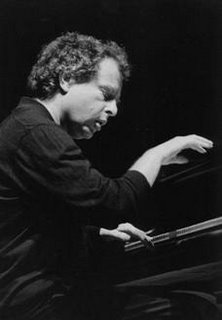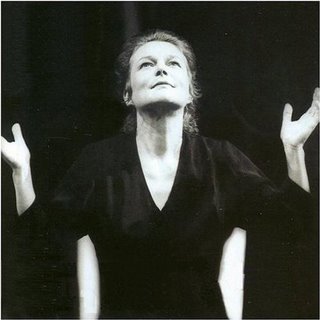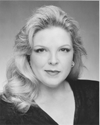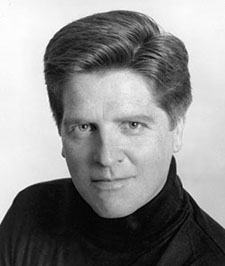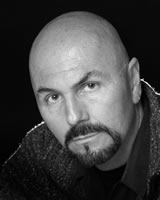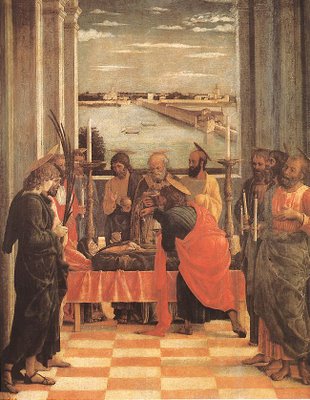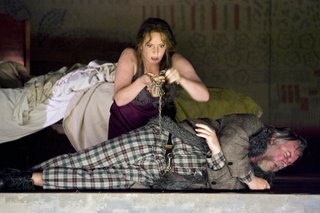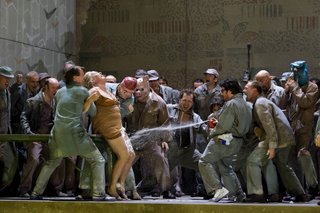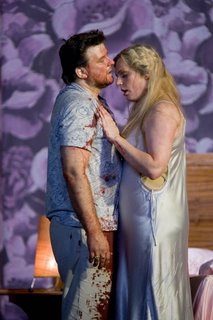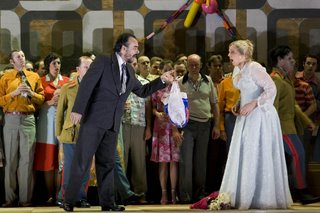Last month | Next monthClassical Month in Washington is a monthly feature that appears on the first of the month. If there are concerts you would like to see included on our schedule, send your suggestions by e-mail (ionarts at gmail dot com). Happy listening!December 1, 2006 (Fri)
7 pmNational Symphony Orchestra, with Iván FischerMusic by Henderson, Sibelius, Strauss, Brahms, and others
Kennedy Center Concert Hall
Review -- Jens F. Laurson (
Ionarts, December 1)
December 1, 2006 (Fri)
7:30 pmAnnual Christmas Concert for Charity [FREE, with goodwill offering for charity]
National Shrine Choir / Choir and Orchestra of Catholic University
Basilica of the National Shrine of the Immaculate Conception (4th Street and Michigan Avenue NE)
December 1, 2006 (Fri)
7:30 pmTribute to Django Reinhardt and French chansons
Panamanouche
La Maison FrançaiseDecember 1, 2006 (Fri)
7:30 pmIranian composer Kazem Davoudian,
Footsteps of the MountainEnchanted String Ensemble
Kennedy Center Terrace Theater
December 1, 2006 (Fri)
8 pmUniversity of Maryland Symphony OrchestraBartók’s
Music for Strings, Percussion, and Celeste and Schubert’s “Great” Symphony No. 9
Clarice Smith Performing Arts Center
Review -- Andrew Lindemann Malone (
Washington Post, December 4)
December 1, 2006 (Fri)
8 pmCarlisle Floyd,
SusannahVirginia Opera
George Mason University Center for the Arts (Fairfax, Va.)
Review -- Mark J. Estren (
Washington Post, November 15)
December 1, 2006 (Fri)
8 pmPinchas Zukerman (violin and viola), Marc Neikrug (piano)Washington Performing Arts SocietyMusic Center at Strathmore
December 1, 2006 (Fri)
8 pmBaltimore Symphony Orchestra: Baroque in NatureIncludes
Water Music by Telemann and Handel
Meyerhoff Symphony Hall (Baltimore, Md.)
Review -- Cecelia Porter (
Washington Post, December 4)
December 2, 2006 (Sat)
7:30 pmA String Family Portrait (music by Higdon, Bacewicz, Bridge, and the Mendelssohn octet)
Left Bank Concert Society
Kennedy Center
Review -- Charles T. Downey (
Ionarts, December 4)
December 2, 2006 (Sat)
8 pmNational Symphony Orchestra, with Iván FischerMusic by Henderson, Sibelius, Strauss, Brahms, and others
Kennedy Center Concert Hall
December 2, 2006 (Sat)
8 pmBaltimore Symphony Orchestra: Baroque in NatureIncludes
Water Music by Telemann and Handel
Music Center at Strathmore
December 2, 2006 (Sat)
8:30 pmMiró Quartet
Music by Beethoven, Schubert, and a new piece
Jewish Community Center of Greater Washington (Rockville, Md.)
December 3, 2006 (Sun)
2 pmJean-Frédéric Neuburger, pianoYoung Concert Artists Series
Kennedy Center Terrace Theater
Review -- Tim Page (
Washington Post, December 5)
December 3, 2006 (Sun)
2 pmCarlisle Floyd,
SusannahVirginia Opera
George Mason University Center for the Arts (Fairfax, Va.)
December 3, 2006 (Sun)
3 pmDecember Recital [FREE, with reception]
Piano Society of Greater Washington
Calvary Lutheran Church (Silver Spring, Md.)
December 3, 2006 (Sun)
3 pmBaltimore Symphony Orchestra: Baroque in NatureIncludes
Water Music by Telemann and Handel
Meyerhoff Symphony Hall (Baltimore, Md.)
December 3, 2006 (Sun)
4 pmFamily Concert: Our Family's on the Map
Capital City Symphony
Atlas Performing Arts CenterReview -- Charles T. Downey and Master Ionarts (
Ionarts, December 4)
December 3, 2006 (Sun)
4 pmArco Voce, chamber ensemble [FREE]
Phillips CollectionReview -- Joan Reinthaler (
Washington Post, December 5)
December 3, 2006 (Sun)
6:30 pmShaun Tirrell, pianist [FREE]
Music by Liszt, Rachmaninoff, and other composers
National Gallery of ArtDecember 3, 2006 (Sun)
7:30 pmMiró Quartet
Music by Beethoven, Schubert, and a new piece
Jewish Community Center of Greater Washington (Rockville, Md.)
December 6, 2006 (Wed)
7 pmNicolas Angelich, pianoCorcoran Gallery of Art
Review -- Jens F. Laurson (
Ionarts, December 9)
December 6, 2006 (Wed)
8 pmCypress String Quartet
Embassy SeriesEmbassy of the Federal Republic of Germany (4645 Reservoir Road NW)
Review -- Daniel Ginsberg (
Washington Post, December 8)
December 7, 2006 (Thu)
11 amLecture by Daniel Leeson: The Story of the Discovery of Hidden Mozart Memorabilia
Clarice Smith Performing Arts Center (Piano Room: First Floor, Michelle Smith Performing Arts Library)
December 7, 2006 (Thu)
2 pmBaltimore Symphony OrchestraWith guest conductor Kwamé Ryan and Markus Groh (piano)
Music by Pärt, Beethoven, and Schumann
Meyerhoff Symphony Hall (Baltimore, Md.)
December 7, 2006 (Thu)
7 pmNSO Pops: Happy Holidays!With Marvin Hamlisch
Kennedy Center Concert Hall
December 7, 2006 (Thu)
7:30 pmNicolas Angelich, piano
La Maison FrançaiseDecember 7, 2006 (Thu)
7:30 pmShanghai Quartet [FREE]
Freer Gallery of ArtReview -- Jens F. Laurson (
Ionarts, December 8)
December 7, 2006 (Thu)
8 pmOrchestra of the Age of Enlightenment [FREE]
Music by Mozart and Anton Stadler
Library of Congress (pre-concert presentation, 6:15 pm)
Review -- Charles T. Downey (
Ionarts, December 9)
December 7, 2006 (Thu)
8 pmMenotti,
Amahl and the Night VisitorsOpera ViventeEmmanuel Episcopal Church (Baltimore, Md.)
December 8, 2006 (Fri)
7 pmNSO Pops: Happy Holidays!With Marvin Hamlisch
Kennedy Center Concert Hall
December 8, 2006 (Fri)
8 pmHandel's M-Word
Washington National Cathedral Choir and Baroque Orchestra
Washington National Cathedral
December 8, 2006 (Fri)
8 pmMenotti,
Amahl and the Night VisitorsOpera ViventeEmmanuel Episcopal Church (Baltimore, Md.)
December 8, 2006 (Fri)
8 pmFestival of Lights: Turtle Island String Quartet
Friends of MusicDumbarton Oaks
December 8, 2006 (Fri)
8 pmDan Zhu (violin) and Akiko Chiba (piano)
Embassy SeriesEmbassy of the People's Republic of China (2300 Connecticut Avenue NW)
December 8, 2006 (Fri)
8 pmBaltimore Symphony: Soulful CelebrationNutcracker Suite (Duke Ellington arrangement) and Quincy Jones,
Soulful CelebrationMeyerhoff Symphony Hall (Baltimore, Md.)
December 9, 2006 (Sat)
11 am (Casual Concert)
Baltimore Symphony OrchestraWith guest conductor Kwamé Ryan and Markus Groh (piano)
Music by Beethoven and Schumann
Meyerhoff Symphony Hall (Baltimore, Md.)
Review -- Tim Page (
Washington Post, December 11)
December 9, 2006 (Sat)
1:30 and 2:30 pmHoliday caroling in the Rotunda [FREE]
National Gallery of ArtDecember 9, 2006 (Sat)
2 pmMenotti,
Amahl and the Night VisitorsOpera ViventeEmmanuel Episcopal Church (Baltimore, Md.)
December 9, 2006 (Sat)
7:30 pmHan-Na Chang (cello) and Sergio Tiempo (piano)Washington Performing Arts SocietyKennedy Center Terrace Theater
Review -- Daniel Ginsberg (
Washington Post, December 11)
December 9, 2006 (Sat)
7:30 pmBaltimore Symphony: Handel's M-WordConcert Artists of Baltimore Symphonic Chorale
Meyerhoff Symphony Hall (Baltimore, Md.)
December 9, 2006 (Sat)
8 pmFestival of Lights: Turtle Island String Quartet
Friends of MusicDumbarton Oaks
December 9, 2006 (Sat)
8 pmNSO Pops: Happy Holidays!With Marvin Hamlisch
Kennedy Center Concert Hall
December 10, 2006 (Sun)
1:30 and 2:30 pmHoliday caroling in the Rotunda [FREE]
National Gallery of ArtDecember 10, 2006 (Sun)
2 pmMenotti,
Amahl and the Night VisitorsOpera ViventeEmmanuel Episcopal Church (Baltimore, Md.)
December 10, 2006 (Sun)
3 pmSeason's Greetings
The Metropolitan Chorus, with Washington Balalaika Society
Thomas Jefferson Theatre (Arlington, Va.)
December 10, 2006 (Sun)
3 pmWonny Song, piano
Jewish Community Center of Greater Washington (Rockville, Md.)
December 10, 2006 (Sun)
4 pmHandel's M-Word
Washington National Cathedral Choir and Baroque Orchestra
Washington National Cathedral
December 10, 2006 (Sun)
4 pmPeter Serkin, piano
Foundation for the Advancement of Education in the SciencesCongregation Beth-El (Bethesda, Md.)
December 10, 2006 (Sun)
4 pmYu Jin, viola with piano [FREE]
Phillips CollectionDecember 10, 2006 (Sun)
5:30 pmStephanie Blythe, mezzo-soprano, with pianist Warren JonesSongs by Brahms, Duparc, and De Falla
Shriver Hall (Baltimore, Md.)
Review -- Charles T. Downey (
Ionarts, December 12)
December 10, 2006 (Sun)
6:30 pmAnonymous 4
19th-century American hymns and tunes
National Gallery of ArtDecember 10, 2006 (Sun)
7 pmFestival of Lights: Turtle Island String Quartet
Friends of MusicDumbarton Oaks
December 10, 2006 (Sun)
7 pmNSO Pops: Happy Holidays!With Marvin Hamlisch
Kennedy Center Concert Hall
December 10, 2006 (Sun)
7:30 pmEmpire BrassKennedy Center Terrace Theater
Review -- Cecelia Porter (
Washington Post, December 12)
December 12, 2006 (Tue)
7:30 pmArmide Seminar (with Philip Kennicott, Nizam Kettaneh, Orest Ranum, and Patricia Ranum)
Hosted by
Opera LafayetteLa Maison Française
December 13, 2006 (Wed)
7:30 pmBrooke Evers, sopranoThe Mansion at Strathmore
December 14, 2006 (Thu)
7 pmNational Symphony Orchestra, with André Watts, pianoKennedy Center Concert Hall
Review -- Jens F. Laurson (
Ionarts, December 15)
December 14, 2006 (Thu)
7 pmA Viennese ChristmasSigmund Romberg Orchestra and Soloists
Music Center at Strathmore
December 15, 2006 (Fri)
7 pmNational Symphony Orchestra, with André Watts, pianoKennedy Center Concert Hall
December 15, 2006 (Fri)
7:30 pmMozart,
Le Nozze di FigaroOpera Bel CantantiEmbassy of Austria (3524 International Court NW)
Review -- Mark J. Estren (
Washington Post, December 18)
December 15, 2006 (Fri)
8 pmGreensleeves: Christmas at the Court and Chapel of Henry VIIIFolger Consort
Folger Shakespeare Library
Review -- Charles T. Downey (
Ionarts, December 22)
[CANCELLED]
December 15, 2006 (Fri)
8 pm
Palestrina, Missa Hodie Christus natus est; Schütz, Christmas Oratorio
Chantry, with Orchestra of the 17th Century
Location TBADecember 15, 2006 (Fri)
8 pmThe Joy of ChristmasCathedral Choral Society and Children’s Chorus of Washington
With organist Scott Dettra and Washington Symphonic Brass
Washington National CathedralReview -- Andrew Lindemann Malone (
Washington Post, December 19)
December 15, 2006 (Fri)
8 pmJoshua Bell (violin), Paul Neubauer (viola), Steven Isserlis (cello), and Jeremy Denk (piano) [FREE]
All-Schumann program
Library of Congress (pre-concert presentation, 6:15 pm)
Review -- Tim Page (
Washington Post, December 18)
December 16, 2006 (Sat)
1:30 and 2:30 pmHoliday caroling in the Rotunda [FREE]
National Gallery of ArtDecember 16, 2006 (Sat)
2 pmThe Washington Chorus: Music for ChristmasKennedy Center Concert Hall
Review -- Tim Page (
Washington Post, December 18)
December 16, 2006 (Sat)
2 and 4 pmChoral Arts Society: Family Christmas ConcertKennedy Center Terrace Theater
December 16, 2006 (Sat)
4 pmChristmas Concert
Suspicious Cheese LordsSt. Paul's Lutheran Church (4900 Connecticut Avenue NW)
December 16, 2006 (Sat)
4 pmThe Joy of ChristmasCathedral Choral Society and Children’s Chorus of Washington
With organist Scott Dettra and Washington Symphonic Brass
Washington National CathedralDecember 16, 2006 (Sat)
5 and 8 pmGreensleeves: Christmas at the Court and Chapel of Henry VIIIFolger Consort
Folger Shakespeare Library
December 16, 2006 (Sat)
7:30 pmHandel, Der M-Word (Mozart orchestration, sung in German)
Cantate Chamber SingersSt. Columba’s Episcopal Church (4201 Albemarle Street NW)
December 16, 2006 (Sat)
7:30 pmMozart,
Le Nozze di FigaroOpera Bel CantantiEmbassy of Austria (3524 International Court NW)
December 16, 2006 (Sat)
8 pmPalestrina, Missa Hodie Christus natus est; Schütz, Christmas Oratorio
Chantry, with Orchestra of the 17th Century
St. Mary Mother of God
Review -- Charles T. Downey (
Ionarts, December 18)
December 16, 2006 (Sat)
8 pmNational Symphony Orchestra, with André Watts, pianoKennedy Center Concert Hall
December 17, 2006 (Sun)
11 amGerald Finzi,
In Terra Pax ("A Christmas Scene for Soprano and Baritone Soloists, Choir, and Chamber Orchestra")
Capitol Hill Presbyterian Church Choir (Adam Turner, music director)
Free (in the context of a religious service)
Capitol Hill Presbyterian Church (4th Street and Independence Avenue SE)
December 17, 2006 (Sun)
1:30 and 2:30 pmHoliday caroling in the Rotunda [FREE]
National Gallery of ArtDecember 17, 2006 (Sun)
2 pmKennedy Center Chamber PlayersMusic by Beethoven, Crumb (
A Little Suite for Christmas, A.D. 1979), and Brahms
Kennedy Center Terrace Theater
Review -- Mark J. Estren (
Washington Post, December 19)
December 17, 2006 (Sun)
2 pmChristmas Candlelight ConcertMaster Chorale of Washington
Kennedy Center Concert Hall
December 17, 2006 (Sun)
2 and 5 pmGreensleeves: Christmas at the Court and Chapel of Henry VIIIFolger Consort
Folger Shakespeare Library
December 17, 2006 (Sun)
3 and 7:30 pmHoliday ConcertHeritage Signature Chorale
The Mansion at Strathmore
December 17, 2006 (Sun)
4 pmThe Joy of ChristmasCathedral Choral Society and Children’s Chorus of Washington
With organist Scott Dettra and Washington Symphonic Brass
Washington National CathedralDecember 17, 2006 (Sun)
4 pmHandel, Der M-Word (Mozart orchestration, sung in German)
Cantate Chamber SingersWestmoreland Congregational Church (Bethesda, Md.)
December 17, 2006 (Sun)
4 pmSoyeon Lee, piano [FREE]
Phillips CollectionDecember 17, 2006 (Sun)
5 pmHoliday Carol Sing [FREE]
Capital City Symphony and Congressional Chorus
Atlas Performing Arts CenterDecember 17, 2006 (Sun)
6:30 pmNordic Voices [FREE]
Christmas music from Norway and other countries
In association with the Norwegian Christmas Festival
National Gallery of ArtDecember 18, 2006 (Mon)
7 pmChoral Arts Society of Washington: Christmas MusicKennedy Center Concert Hall
Review -- Stephen Brookes (
Washington Post, December 20)
December 18, 2006 (Mon)
7:30 pmMozart,
Le Nozze di Figaro (abridged version)
Opera Bel CantantiEmbassy of Germany
December 18, 2006 (Mon)
8 pmStradivari Anniversary Concert: Ensō Quartet [FREE]
Music by Mozart, Ginastera, and Dvořák
Library of Congress (pre-concert presentation, 6:15 pm)
Review -- Charles T. Downey (
Ionarts, December 20)
December 19, 2006 (Tue)
7:30 pmGreensleeves: Christmas at the Court and Chapel of Henry VIIIFolger Consort
Folger Shakespeare Library
December 19, 2006 (Tue)
7:30 pmMozart,
Le Nozze di FigaroOpera Bel CantantiEmbassy of Austria (3524 International Court NW)
December 20, 2006 (Wed)
7 pmChristmas Music with the American Youth PhilharmonicChoral Arts Society with Jennifer Larmore, mezzo-soprano
Music Center at Strathmore
December 20, 2006 (Wed)
7:30 pmGreensleeves: Christmas at the Court and Chapel of Henry VIIIFolger Consort
Folger Shakespeare Library
December 21, 2006 (Thu)
7 pmNational Symphony Orchestra: Handel's M-WordCathedral Choral Society
Kennedy Center Concert Hall
Review -- Grace Jean (
Washington Post, December 22)
December 21, 2006 (Thu)
7 pmThe Washington Chorus: Music for ChristmasMusic Center at Strathmore
December 21, 2006 (Thu)
7:30 pmGreensleeves: Christmas at the Court and Chapel of Henry VIIIFolger Consort
Folger Shakespeare Library
December 21, 2006 (Thu)
7:30 pmCarl Banner, piano
Washington Musica VivaDennis and Phillip Ratner Museum (Bethesda, Md.)
December 22, 2006 (Fri)
1:30 pmChoral Arts Society of Washington: Christmas MusicKennedy Center Concert Hall
December 22, 2006 (Fri)
7 pmNational Symphony Orchestra: Handel's M-WordCathedral Choral Society
Kennedy Center Concert Hall
December 22, 2006 (Fri)
7:30 pmMozart,
Le Nozze di FigaroOpera Bel CantantiRandolph Road Theatre (Bethesda, Md.)
December 22, 2006 (Fri)
8 pmGreensleeves: Christmas at the Court and Chapel of Henry VIIIFolger Consort
Folger Shakespeare Library
December 23, 2006 (Sat)
1 pmThe Washington Chorus: Music for ChristmasKennedy Center Concert Hall
December 23, 2006 (Sat)
1:30 and 2:30 pmHoliday caroling in the Rotunda [FREE]
National Gallery of ArtDecember 23, 2006 (Sat)
4 pmChristmas Candlelight ConcertMaster Chorale of Washington
Kennedy Center Concert Hall
Review -- Andrew Lindemann Malone (
Washington Post, December 25)
December 23, 2006 (Sat)
5 pmGreensleeves: Christmas at the Court and Chapel of Henry VIIIFolger Consort
Folger Shakespeare Library
December 23, 2006 (Sat)
8 pmNational Symphony Orchestra: Handel's M-WordCathedral Choral Society
Kennedy Center Concert Hall
December 23, 2006 (Sat)
8 pmNational Philharmonic: Handel's M-WordMusic Center at Strathmore
Review -- Grace Jean (
Washington Post, December 25)
December 24, 2006 (Sun)
1 pmNational Symphony Orchestra: Handel's M-WordCathedral Choral Society
Kennedy Center Concert Hall
December 24, 2006 (Sun)
1:30 and 2:30 pmHoliday caroling in the Rotunda [FREE]
National Gallery of ArtDecember 29, 2006 (Fri)
7:30 pmMozart,
Le Nozze di FigaroOpera Bel CantantiRandolph Road Theatre (Bethesda, Md.)
